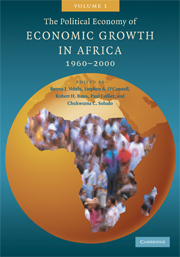Book contents
- Frontmatter
- Contents
- List of figures
- List of tables
- List of contributors
- Foreword
- List of acronyms
- PART 1 OVERVIEW
- PART 2 INTERPRETATION
- 4 Domestic interests and control regimes
- 5 Sacrificing the future: intertemporal strategies and their implications for growth
- 6 The political geography of redistribution
- 7 Political conflict and state failure
- 8 Shocks, risk, and African growth
- PART 3 EXPLANATION
- PART 4 LOOKING AHEAD
- Index
- References
6 - The political geography of redistribution
Published online by Cambridge University Press: 09 January 2010
- Frontmatter
- Contents
- List of figures
- List of tables
- List of contributors
- Foreword
- List of acronyms
- PART 1 OVERVIEW
- PART 2 INTERPRETATION
- 4 Domestic interests and control regimes
- 5 Sacrificing the future: intertemporal strategies and their implications for growth
- 6 The political geography of redistribution
- 7 Political conflict and state failure
- 8 Shocks, risk, and African growth
- PART 3 EXPLANATION
- PART 4 LOOKING AHEAD
- Index
- References
Summary
Introduction
Poor countries are not uniformly poor. In many African countries, there is generally a simple mapping between the allocation of wealth across ethnic groups and their geographical distribution. For example, in West African countries, the cultural and religious divisions between ethnic groups are strongly correlated with the difference in wealth between them. There is a sharp contrast between a relatively affluent south and a poorer north in most of the countries of this area. For instance, in Chad, the southerners produce cotton, while the northerners are poor nomadic herdsmen. A similar distribution of activities can be found in Mali and Niger, where southerners are agriculturists, and northerners are nomadic herdsmen. In Côte d'Ivoire, the northerners also produce cotton, but there it is a poorer crop than the coffee and cocoa produced by the southerners. In Nigeria, the giant country of Africa, the northerners rely on a typical Sahelian agriculture, growing cotton and millet, while oil dominates the southern economy.
In these countries, a typical political pattern seems to emerge: a military regime often prevails when the northerners are in power, while civilian rule seems to be the dominant mode of government when the southerners are in power. François Tombalbaye in Chad and Félix Houphouët-Boigny in Côte d'Ivoire were from the south of their countries, and ran civilian governments. The Hausa generals from northern Nigeria came to power time and again, while the southerner Olesegun Obasanjo led the return to civilian rule in that country (see Zartman et al. 1997).
- Type
- Chapter
- Information
- The Political Economy of Economic Growth in Africa, 1960–2000 , pp. 225 - 248Publisher: Cambridge University PressPrint publication year: 2007
References
- 1
- Cited by



